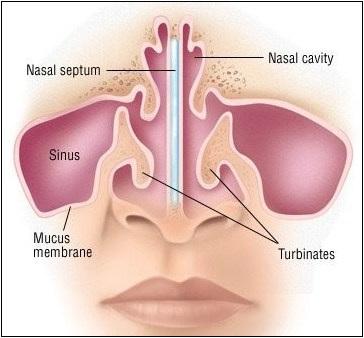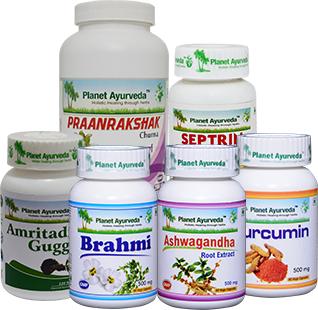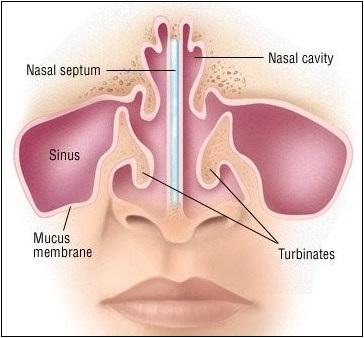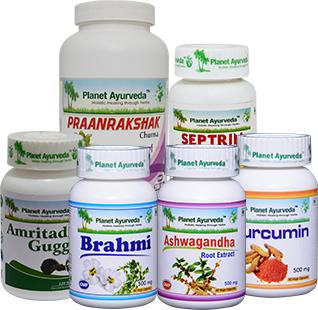Sense organs are a wonderful gift that nature has provided to us. These include eyes, ears, nose, tongue, and skin. As these sense organs are vital and complex and so does their functioning. As with any other parts of the body sense organs are also prone to a number of injuries and diseases. The nose has dual functions as it helps in smelling and breathing. In this text, we are going to discuss the deviated nasal septum (DNS). This is an important cause of nasal obstruction. In this article, we shall discuss the condition of deviated nasal septum and its management in the contemporary system of medicine and the traditional Indian medicinal system of Ayurveda. Let's have a look !!

Introduction
The deviated nasal septum is a common disorder of the nasal septum, usually caused by trauma during labor or later at birth. Sometimes this can occur due to connective tissue disorders such as Marfan syndrome. This occurs when the septum of the nose tilts to one side of the nostril which can cause severe obstruction and hampers the process of breathing and smelling from the affected side. If not managed timely the symptoms might get severe and therefore the management of the same is required. In Ayurveda, the condition is compared with the nasanaha based on the cardinal feature of the nasal obstruction. Now let's discuss the causes, clinical features, and management of the deviated nasal septum and discuss its Ayurvedic management.
Causes of Deviated Nasal Septum
Errors of the development and trauma are the two major reasons for the devoted nasal septum :
Trauma
A lateral blow on the nose may lead to the displacement of the nasal septal cartilage from the vomerine groove and maxillary crest, while a crushing blow from the front may result in buckling, fractures, duplication, and twisting of the nasal septum. Trauma during birth due to difficult labor occurs when the nose is pressed in the passage of the birth canal. Birth injuries must be attended to as they can result in septal deviation later.
Racial factors
Caucasians are more commonly affected than black Americans.
Developmental Errors
The nasal septum is created by the tectoseptal process which slides to meet the two parts /halves of the developing palate in the center. During the first and second dentitions, development takes place in the palate, which slides and open ups to accommodate the teeth. Unequal and uneven growth between the palate and the base of the skull can result in the buckling of the nasal septum. In those who breathe with their mouth, the palate is usually highly arched and the septum thus deviates. Similarly, deviated nasal septum can be seen in cases of cleft palate and lip and in those with abnormal dentures.
Hereditary factors
A few members of the same family can have deviated nasal septum, which proves the positive hereditary dominance of deviated nasal septum.
Types of Deviated Nasal Septums
The deviation may involve only the cartilage, bone, or both the cartilage and bone.
Anterior dislocation
Septal cartilage may be dislocated into either of the nasal chambers. This is better seen by looking at the base of the nose when the patient's head is positioned or left backward.
C-shaped deformity
Septum is dislocated in a normal curve to one side. The nasal chamber on the concave side of the nasal septum results in a wider side and can show compensatory hypertrophy of turbinates.
S-Shaped deformity
Either in an anteroposterior or vertical plane, this type of deformity may cause both side obstruction of the nasal cavity.
Spurs
A spur is a shelf-like outgrowth that is often found at the junction of cartilage and bone. A spur can press on the lateral wall and can cause a headache. It may also result in repeated epistaxis from the blood vessels present on its convex surface.
Thickening
It may be due to organized hematoma or the overriding of displaced fragments of the septum.
Signs and symptoms
Deviated nasal septum can involve any age and sex. Though males are more affected than females.
● Nasal obstruction
Depending on the type of septal deformity, the obstruction may be unilateral or bilateral. Respiratory currents pass through the upper part of the nasal cavity, therefore, high septal deviation causes nasal obstruction more than lower ones.
● Headache
Deviated septum, a spur, may press on the lateral wall of the nose giving rise to pressure headache.
● Sinusitis
A deviated septum may obstruct sinus ostia resulting in poor ventilation of the sinuses. Therefore, it forms an important cause to predispose or perpetuate sinus infections.
● Anosmia
Failure of the inspired air to reach the olfactory region may result in partial or complete loss of sense of smell.
● External deformity
Septal deformities may be associated with deviation of the cartilaginous or both the bony and cartilaginous or both the bony and cartilaginous dorsum of the nose, deformities of the nasal tip, or columella.
● Epistaxis
Mucosa over the deviated part of the septum is exposed to the drying effects of air currents leading to the formation of crusts, which when removed causes bleeding. Bleeding may also occur from vessels over a septal spur.
● Middle ear infection
DNS also predisposes to a middle ear infection.
● Preference for sleeping on a particular side.
● Noisy breathing during sleep.
● Snoring
● Whistling sound during breathing
Management :● Nasal corticosteroid spray
● Decongestants
● Antihistamines
● NSAIDS (Non-steroidal anti-inflammatory drugs)
● Submucous resection (SMR) operation
● Septoplasty
Complications:● Dry mouth as the patient, mouth breathes in bilateral obstruction of the nostrils
● Disturbed sleep
● A sense of pressure in the nostrils
● Bleeding
Investigations
● Physical examination
● Nasal speculum
● Fibre optic nasal endoscopy
● CT Scan
Ayurvedic aspect and management of DNSAyurveda, the traditional medicinal system of India is a great life science that helps in the management of all disorders. Charak Samhita, Sushruta Samhita, Ashtanghridyam, etc are the major textbooks of Ayurveda. Charak Samhita and Ashtanghridyam focus on herbal management whereas Sushruta Samhita holds the surgical lens. Ayurveda is helping patients with their chronic conditions and Ayurveda is positively managing these conditions.
Deviated Nasal Septum is correlated with nasanaha based on the cardinal symptom of nasal obstruction.
The condition occurs due to enveloping of the udana vata with Kapha dosha which leads to restricted and blocked nostrils as per Acharya Sushruta.
The clinical features include the feeling of nasal obstruction and it leads to problematic breathing in and breathing out.
The management of nasanaha includes snehapana, snighdha dhoompana, shirovasti, and the management of the vata vyadhi.
According to Acharya Vagbhata bala taila should be consumed and drops of the same for instilling in the nostrils.
The mams ras (meat soup) should be consumed and Sweden should be performed.
Guggul (Commiphora mukul), Haridra ( Curcuma longa), ashwagandha (Withania somnifera), Amalaki (Embellica officinalis), bibhitaki (Terminalia bellerica), haritaki (Terminalia chebula) etc are helpful in deviated nasal septum.
Herbal remedies by Planet Ayurveda for Deviated Nasal SeptumPlanet Ayurveda is an eminent US-FDA registered, GMP certified, and ISO 9001:2015 certified Ayurvedic Company, which adhered to the aim of manufacturing standard Ayurvedic medicines as given in the various ancient scriptures of Ayurveda. Medicines are prepared without preservatives and additives and other kinds of synthesized material which cause many ill effects on the human body. Products manufactured at Planet Ayurveda are pure and devoid of any adulteration. Planet Ayurveda extends its herbal formulations that are helpful in managing the condition of deviated nasal septum.
Following are some of the products of Planet Ayurveda that are helpful in DNS1. CURCUMIN CAPSULES
2. SEPTRIN TABLETS
3. PRAANRAKSHAK CHURNA
4. AMRITADI GUGGUL
5. BRAHMI CAPSULES
6. ASHWAGANDHA CAPSULES
Product Description

Curcumin capsules are a product of Planet Ayurveda. It contains the herbal extract of Haridra (Curcuma longa) which is the best anti-inflammatory medicine. Haridra has been in use for a number of health issues. In the inflammatory condition of the nasal mucosa due to deviated nasal septum, Curcumin capsules help in the same and alleviate the symptoms such as problematic breathing.
Dosage One capsule two times a day.
SEPTRIN TABLETSSeptrin tablets are a product of Planet Ayurveda that is composed of the herbs such as pippali (Piper longum), Haridra (Curcuma longa), sonth (Zingiber officinale), guggul (Commiphora mukul), tulsi (Ocimum sanctum) and Marich (Piper nigrum). The Septrin tablets are helpful in a number of infectious conditions caused by a number of microbes such as bacteria, viruses, protozoa, fungi, etc. These possess analgesic, anti-inflammatory, and antipyretic properties. Further it also alleviates allergic symptoms. Therefore Septrin tablets are of great help in the inflamed mucosa of the nasal cavity because of the deviated nasal septum.
Dosage: Two tablets twice a day.
PRAANRAKSHAK CHURNAPraanrakshak Churna is a churna (powder) formulation of Planet Ayurveda. It is composed of the herbs such as dalchini (Cinnamomum zeylanica), bharangi (Clerodendrum serratum), vasa (Adhatoda vasica), anantmool (Hemidesmus indicus), mulethi (Glycyrrhiza glabra), kantkari (Solanum xanthocarpum), etc. All these herbs are known to alleviate nasal allergic symptoms and also help in the anosmia and other symptoms associated with deviated nasal septum. It reduces the inflammation of the nasal mucosa and also helps in the hypertrophied turbinates of the overused nostril. In this way, Praanrakshak Churna helps with deviated nasal septum.
Dosage 1/2 tsp twice with Ginger swaras (juice)
AMRITADI GUGGULAmritadi guggul is a classical herbal proprietary medicine. Amritadi guggul is filled with the tridosha balancing and antiinflammatory properties of Guduchi (Tinospora cordifolia), amla (Emblica officinalis), bibhitaki (Terminalia bellirica), haritaki (Terminalia chebula) and guggul resin (Commiphora mukul). All these herbs pacify the kapha and pitta dosha and also remove the enveloping of the udana vata by Kapha dosha. Guggul helps in alleviating the inflammation of the nasal mucosa. Thus, Amritadi guggul manages the symptoms of deviated nasal symptoms such as trouble breathing and others.
Dosage 2 tablets twice daily with plain water after meals.
BRAHMI CAPSULESBrahmi Capsule is a product of Planet Ayurveda formulated with the medhya herb Brahmi (Bacopa monnieri). It has a sheet of very (cold potency) that exhibits soothing action on the body and gives strength to the brain. Brahmi is a very good medhya rasayan (brain tonic), agnivardhak (increases digestive fire ), and rasayan (immunomodulator). Brahmi reduces inflammation, lowers blood pressure, and prevents anxiety and stress. By pacifying the vata dosha, it helps in alleviating the symptoms associated with deviated nasal symptoms. Brahmi capsules help in satisfactory breathing and also help in a good sense of smell. Hence it works amazingly in the management of deviated nasal septum.
Dosage One capsule twice a day.
ASHWAGANDHA CAPSULESAshwagandha capsules are a product of Planet Ayurveda which are enriched with the amazing properties of the herb ashwagandha (Withania somnifera) that acts as rasayan. The capsules pacify the vata dosha. And benefits in maintaining the good health of the sense organs and the neurological system. As ashwagandha possesses satanic properties thus helps in the overall management of bodily functions. In this condition of the deviated nasal septum, it helps by alleviating the inflamed mucosa. By pacifying the vata dosha it helps in the anosmia and recurrent infections of the nasal cavity. By its above-said actions, Ashwagandha capsules are of much help in the management of deviated nasal septum.
Dosage: One capsule twice a day.
CONTACT PLANET AYURVEDA TO PROVIDE YOU THE COSTING / ORDERING AND DELIVERY INFORMATION AT - [email protected] OR CALL AT +91-172-5214040Conclusion
Deviated Nasal Septum is a very common problem that is dealt with by Ear Nose and Throat specialists on a daily basis. There are a number of reasons that lead to the improper or anatomical deformity of the nasal septum. Most of the cases are related to injury/trauma to the nose. A deviated septum of the nose can lead to a number of symptoms from mild to severe. Nasal obstruction stays on the top of the list of clinical features whereas anosmia, allergy-like symptoms may also accompany the obstruction. The products mentioned above are purely natural and chemical-free. These provide extraordinary results in the symptoms associated with deviated nasal septum such as recurrent infection of the sinuses, nasal cavity, hypertrophied turbinates, anosmia, etc, and also alleviate the complications of deviated nasal septum such as mouth breathing, snoring, and disturbed sleep.

● Nasal obstruction
● Headache
● Sinusitis
● Anosmia
● External deformity
● Epistaxis
● Middle ear infection
● Noisy breathing during sleep.
● Snoring
Management :● Nasal corticosteroid spray
● Decongestants
● Antihistamines
● Septoplasty
Complications:● Disturbed sleep
● Bleeding
● Physical examination
● Nasal speculum
● Fibre optic nasal endoscopy
● CT Scan
1. CURCUMIN CAPSULES
2. SEPTRIN TABLETS
3. PRAANRAKSHAK CHURNA
4. AMRITADI GUGGUL
5. BRAHMI CAPSULES
6. ASHWAGANDHA CAPSULES
Product Description


